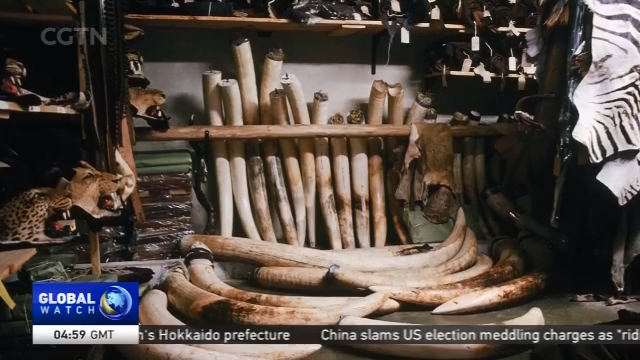
15:01, 05-Oct-2018
The Chinese Face in Elephant Protection: Huang Hongxiang: A Chinese undercover investigator of ivory trade
Updated
14:18, 08-Oct-2018
03:15

China's ban on all ivory trade and processing activities was hailed by conservation groups as "historic" and a "game-changer" for the future of elephants. With China out of the picture, it's a huge blow to those who profited from the multi-billion dollar industry. One Chinese man became so frustrated about illegal ivory trading that he went undercover in Africa trying to expose traffickers. He's now trying to change global perceptions about China when it comes to animal protection. Here's his story.
Huang Hongxiang was an undercover investigator of illegal ivory trade in Africa. The job is as dangerous as it sounds.
HUANG HONGXIANG WILDLIFE PROTECTION ACTIVIST "A lot of the time I'm wearing a hidden camera, and if people found you with that, you are going to be in major trouble."
He was featured in the 2016 documentary The Ivory Game, in which he posed as a Chinese ivory buyer who tricked a Ugandan dealer into a police trap.
HUANG HONGXIANG WILDLIFE PROTECTION ACTIVIST "When the police show up, you would be the person closest to that criminal. So who knows what could happen. Who knows whether he has a gun, or a knife, who knows what he might do. So of course, I was pretty nervous in the beginning."
YANG CHENGXI SHANGHAI "Huang may not look much like a rich Chinese ivory buyer. Well the truth is that it doesn't really matter. All you need is a Chinese face and a Chinese accent.
"
HUANG HONGXIANG WILDLIFE PROTECTION ACTIVIST "I realized the local traders would use Chinese to talk to me and say 'we have ivory, we have rhino horns and they're cheap'. They won't suspect that you're an investigator or you are NGO people. And then I got realized, oh, nowadays China may be one of the most important buyers of these illegal wildlife products. That incentivized this trade. So as a Chinese, somehow I feel there's a responsibility for me to do something."
The 2016 documentary has brought Huang a lot of exposure. But some of his partners have their doubts about his decision to reveal his identity, which means he could never go undercover again. But he said there's a reason for him to be so public about it.
HUANG HONGXIANG WILDLIFE PROTECTION ACTIVIST "There are a million people in China who can totally do the same. But why so far have there been relatively few Chinese doing these kinds of things? Why, you go to the global wildlife conservation or global NGO area you see a lot of white and maybe black people, some South Americans, but you don't see a lot of Chinese faces?"
In 2014 Huang founded a social enterprise called the China House. Through it, he organized student programs on sustainable development in Africa and other developing areas.
HUANG HONGXIANG WILDLIFE PROTECTION ACTIVIST "We believe that after we educate a lot of Chinese people, knowing what is wildlife conservation, and what is an NGO, and how to do research and investigation, they will be able to do something greater than what I can do."
A few hundred Chinese students have participated. Huang says his long term goal is to change the world's perception of Chinese people in matters of animal protection. Yang Chengxi, CGTN, Shanghai.

SITEMAP
Copyright © 2018 CGTN. Beijing ICP prepared NO.16065310-3
Copyright © 2018 CGTN. Beijing ICP prepared NO.16065310-3